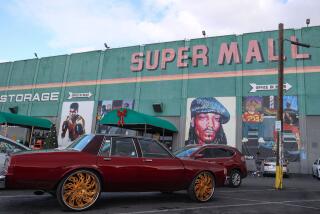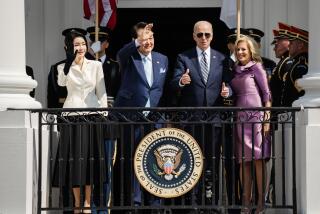Seoul Ford dealer is dealt a lemon as U.S.-South Korea trade agreement stalls
Reporting from Seoul — Song Myoung-geun is a hard-driving car dealer pushing Fords to South Korean buyers. He’s so good at his job that last year he ranked third nationwide in personal sales for the U.S.-made vehicles.
The bad news: He moved 72 cars in 12 months, a rate that surely would win no awards in the United States. By comparison, the top Hyundai salesman here sold 357 vehicles and the maker’s third-place finisher sold 264.
Song’s plight shows the challenge of selling foreign-made automobiles with their added taxes in a nation determined to peddle homegrown brands. But he held out a slight hope that Thursday might bring news that the U.S. and South Korea had completed terms of a trade agreement that would allow him to sell more cars.
Once again, the deal stalled, leaving Song stranded on the side of the road.
“I knew it wouldn’t go through,” he lamented shortly after President Obama and South Korean President Lee Myung-bak acknowledged that there had been no breakthrough in negotiations to give their legislatures a redesigned deal to consider.
The impasse has dealt a blow to the two nations’ relations and $67 billion in trade, with the United States continuing to insist that South Korea’s restrictive auto importation policies discriminate against American cars, limiting the U.S. market share here to about 1%.
Washington has also demanded that Seoul welcome imported beef from older cattle, a dangerous political issue for Lee, who endured massive riots in 2008 over health concerns from such U.S. imports.
Both presidents, facing pressures at home, looked ashen-faced as they announced the stalemate at a news conference on the first day of Seoul’s summit of the Group of 20 industrialized and developing nations.
The American leader was dealt a decided comeuppance by voters in recent midterm elections and hoped to send a signal here on U.S. trade commitments and jobs, while his South Korean counterpart has promised critics an economic boost as summit host.
None of it came to be Thursday as a flurry of behind-the-scenes talks failed, suggesting the difficulty of reaching any consensus as the world’s economic leaders meet through Friday to hammer out complex issues such as currency imbalances and debt.
But perhaps no one was more disappointed than the 32-year-old Song, who since 2004 has been constrained by import taxes that have raised the sticker price of his Mustang, Taurus and Escape models by thousands of dollars.
“It was hard at first; the cars weren’t moving,” he said of those early days. He might sell one or two out of the 40 Fords sold throughout South Korea each month.
Meanwhile, other sales staff members saw buyers packing in to the adjacent Hyundai dealership. The urge to bolt was intense, but Song stayed put.
“Many people walked out,” he said, “but I wanted to sell Fords.”
In 2007, when the U.S. and South Korea initially agreed on a free trade pact that would open the door for more U.S. imports, Song thought his long wait for relief had reached its end. But the deal languished as both national legislatures turned their noses up at what they called a flawed agreement.
“I was devastated,” said Song.
Finally, he resorted to sacrificing more than half of his $2,000 commission to get cars moving out of the showroom.
Slowly, sales improved as Song learned to put the Detroit image to good use. He focused on older Koreans partial to U.S.-made products because of assistance Washington gave their nation during the Korean War, as well as on a more affluent generation of younger customers with fond memories of visits to the United States.
“I began selling the U.S. experience beyond the car,” he said.
The Mustang and Taurus models recently have exerted more muscle on the car market here, with Ford dealers now selling as many as 400 cars a month.
Song knows the failure of a trade deal will continue to make his products a hard sell. But he still hopes the day is coming when he can outsell any dealer — American, European, Japanese or Korean.
“One day soon, we’re going to see a new revolution of American car sales in Korea. And I can’t wait.”
Ethan Kim in The Times’ Seoul Bureau contributed to this report.







